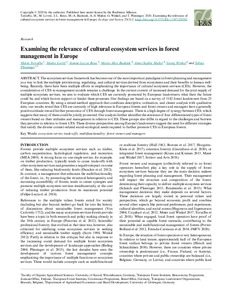| dc.date.accessioned | 2020-08-06T09:46:26Z | |
| dc.date.available | 2020-08-06T09:46:26Z | |
| dc.date.issued | 2020 | |
| dc.identifier | doi:10.17170/kobra-202008051530 | |
| dc.identifier.uri | http://hdl.handle.net/123456789/11672 | |
| dc.description.sponsorship | Gefördert durch den Publikationsfonds der Universität Kassel | ger |
| dc.language.iso | eng | eng |
| dc.rights | Namensnennung-Nicht-kommerziell 4.0 International | * |
| dc.rights.uri | http://creativecommons.org/licenses/by-nc/4.0/ | * |
| dc.subject | ecosystem service trade-offs | eng |
| dc.subject | multifunctionality | eng |
| dc.subject | forest owners and managers | eng |
| dc.subject.ddc | 570 | |
| dc.title | Examining the relevance of cultural ecosystem services in forest management in Europe | eng |
| dc.type | Aufsatz | |
| dcterms.abstract | The ecosystem services framework has become one of the most important paradigms in forest planning and management as a way to link the multiple provisioning, regulating, and cultural services derived from ecosystems and their benefits to human well-being. Recently, there have been multiple efforts in emphasizing the importance of cultural ecosystem services (CES). However, the consideration of CES in management models remains a challenge. In the current context of increased demand for the joint supply of multiple ecosystem services, we aim to evaluate which CES are currently promoted by European landowners, what their the future could be, and which factors support or hinder these processes. Our findings are based on a survey of 1182 forest landowners from 25 European countries. By using a mixed-method approach that combines descriptive, ordination, and cluster analysis with qualitative data, our results reveal that CES are currently of high relevance in European forests and forest owners and managers have a generally positive attitude toward further promotion of CES through forest management. There is a high degree of synergy between CES, which suggests that many of them could be jointly promoted. Our analysis further identifies the existence of four differentiated types of forest owners based on their attitudes and management in relation to CES. These groups also differ in regard to the challenges and barriers they perceive in relation to forest CES. These diverse perspectives among Europe’s landowners suggest the need for different strategies that satisfy the diverse context-related social-ecological needs required to further promote CES in European forests. | eng |
| dcterms.accessRights | open access | |
| dcterms.creator | Torralba, Mario | |
| dcterms.creator | Lovrić, Marko | |
| dcterms.creator | Roux, Jeanne-Lazya | |
| dcterms.creator | Budniok, Marie-Alice | |
| dcterms.creator | Mulier, Anne-Sophie | |
| dcterms.creator | Winkel, Georg | |
| dcterms.creator | Plieninger, Tobias | |
| dc.relation.doi | doi:10.5751/ES-11587-250302 | |
| dc.subject.swd | Ökosystemdienstleistung | ger |
| dc.subject.swd | Forstwirtschaft | ger |
| dc.subject.swd | Kulturlandschaft | ger |
| dc.subject.swd | Waldbesitzer | ger |
| dc.subject.swd | Europa | ger |
| dc.type.version | publishedVersion | |
| dcterms.source.identifier | EISSN 1708-3087 | |
| dcterms.source.issue | Issue 3 | |
| dcterms.source.journal | Ecology and society | eng |
| dcterms.source.pageinfo | Art. 2 | |
| dcterms.source.volume | Volume 25 | |
| kup.iskup | false | |


